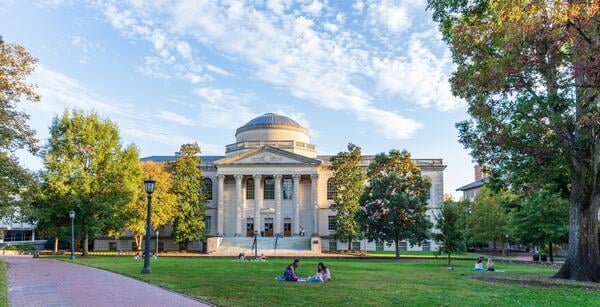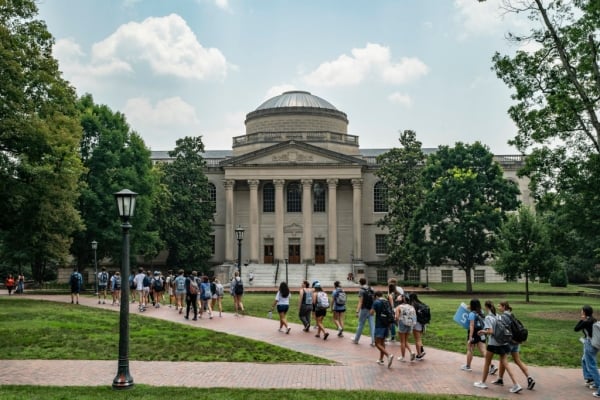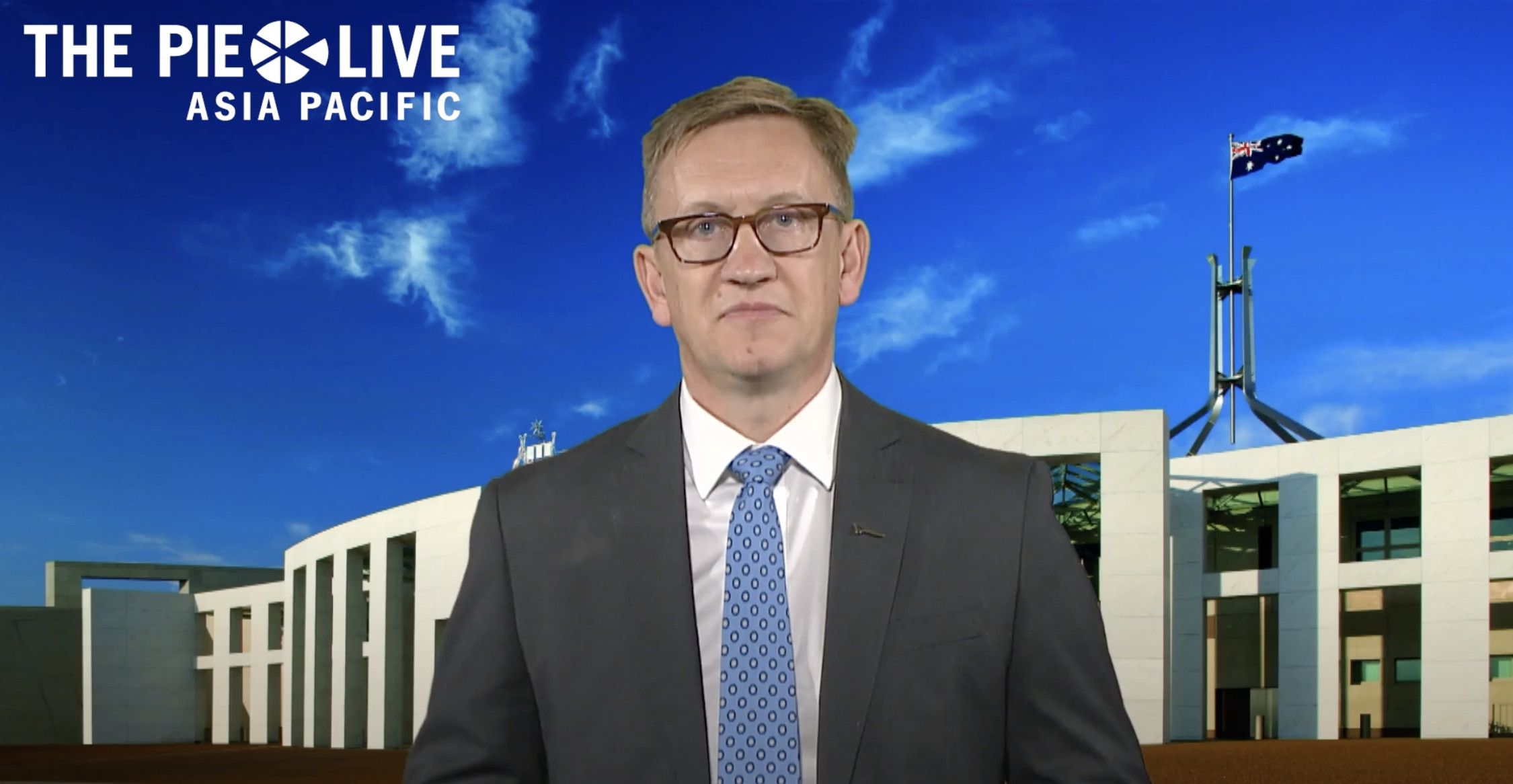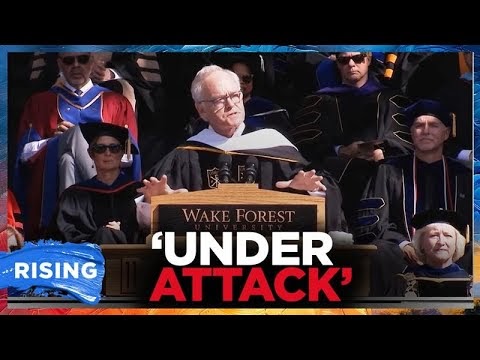A former provost at the University of North Carolina at Chapel Hill accused the Board of Trustees of systematically violating open records and meetings laws on multiple occasions, including to retaliate against him, according to a lawsuit filed earlier this week.
At the heart of the lawsuit from Chris Clemens, who resigned in April, is a delayed tenure vote.
In March, the UNC Board of Trustees postponed a vote to grant tenure to 33 faculty members. At that meeting, held March 20, the board moved into closed session, with Clemens present, apparently to discuss individual tenure cases. Instead, trustees launched into a debate over the value of tenure, with some voicing their philosophical opposition to the practice and others arguing that they should delay such approvals for financial reasons, according to the lawsuit.
The board eventually approved tenure for all 33 candidates in June via an email vote.
According to the lawsuit, Clemens shared details from the meeting with other academic leaders, noting that no tenure decisions were made or individual candidates considered and that the board instead “engaged in a sweeping policy discussion about tenure’s institutional value and global costs.” Following that briefing, the Board of Trustees allegedly communicated through Signal, a private messaging application that includes a feature to automatically delete messages after they are read, to call for a vote of no confidence in Clemens. UNC leadership asked Clemens to step down shortly thereafter, according to the lawsuit.
But even if Clemens’s suit is successful and the violations are proven to be true, the board will likely face few repercussions given past precedent.
A Systemic Pattern
Clemens’s lawsuit also accused Jed Atkins, director and dean of the School for Civic Life and Leadership, of relaying the former provost’s briefing to then–board chair John Preyer via Signal. (Clemens had taken issue with the hiring practices at the civic life school before stepping down.)
The lawsuit alleges that Atkins “requires that his leadership team subscribe to a Signal group and conducts a substantial portion of official communications via Signal with auto-delete enabled not only in exchanges with trustees but as a routine practice,” in violation of state law. Atkins did not respond to a request for comment from Inside Higher Ed.
Beyond the tenure flap, Clemens has accused the board of defying state open meetings laws on multiple occasions in an effort to “hide policy debates from public view,” according to his lawsuit.
“Over the past four years, the Board has engaged in a pattern and practice of systematically violating the Open Meetings Law by improperly invoking closed session exemptions to shield policy and budget deliberations from public scrutiny,” the former provost alleged.
Contacted by Inside Higher Ed, Clemens declined to comment.
In his legal filing, Clemens cited three specific examples beyond the March tenure discussion in which he alleged the board violated open meetings laws. He specifically pointed to a closed session discussion in November 2023, when UNC discussed athletic conference realignment; further secret deliberations over athletics in May 2024 involving both conference realignment and finances; and an “emergency meeting” in December 2024 to hire a head football coach. At the December meeting, UNC Chapel Hill hired NFL legend Bill Belichick on a $10 million annual contract.
(Responding to a separate legal complaint over the May 2024 meeting, trustees previously agreed to reaffirm their commitment to open meetings laws and pay $25,000 in attorneys’ fees.)
“Each episode follows the same pattern: the Board invokes a statutory exemption, enters closed session, then discusses broad policy or budget matters that must be debated publicly,” the lawsuit states.
Despite being allegedly pressured to step down, Clemens isn’t seeking a payout or his job back. Instead, he’s asking the court to prevent the board from continuing its alleged defiance of open meetings laws, to produce minutes or a transcript of the March 20 closed session and to mandate that trustees participate in training on state open meetings and public records laws.
Responses
Contacted by Inside Higher Ed, UNC Chapel Hill spokesperson Kevin Best wrote by email, “We’re aware of the litigation and are reviewing it closely,” but he declined to comment further given the pending nature of the case.
The Board of Trustees released a more forceful statement Wednesday.
“The former Provost’s baseless assault on this volunteer Board and how it conducts its business stands in stark contrast to the widely recognized excellence the University has achieved under this Board’s leadership,” chair Malcom Turner said. “His allegations are disappointing and inaccurate, not to mention a waste of taxpayer dollars, for which this former officer of the University shows no regard. His claims will not withstand scrutiny.”
Most of the individuals named in the lawsuit either declined to comment or did not respond to media inquiries. Multiple faculty and staff members at the School of Civic Life and Leadership (none of whom are defendants in the lawsuit) also did not respond to requests for comment.
However, one source alleged that the former provost instructed employees to use Signal and that he also used it for university business, which Inside Higher Ed confirmed via screenshots.
Allegations that Clemens used Signal come amid an opaque investigation by outside counsel into the School of Civic Life and Leadership that was announced earlier this month. While Chapel Hill leadership has said little about the investigation, it comes after multiple resignations from faculty members in the school, some of whom have alleged it has “lost sight of its mission.”
Dustin Sebell, a School of Civic Life and Leadership professor, told Inside Higher Ed via text message that Clemens “habitually used Signal for university business” and encouraged others to do so. To Sebell, the lawsuit seems like an effort by Clemens to sidestep the investigation.
“By hastily filing a hypocritical lawsuit, Chris is trying to avoid investigators’ questions about his misconduct as Provost by claiming privilege pending ongoing litigation,” Sebell wrote.
But some faculty members, such as Michael Palm—president of the UNC Chapel Hill chapter of the American Association of University Professors—expressed concern about political influence on the board.
“Open meetings laws are important for public universities. Unfortunately, right now we don’t need them to know that the UNC [Board of Trustees] considers UNC faculty to be their enemy,” Palm wrote to Inside Higher Ed via email. “The crisis we’re in is political, not procedural.”
Although North Carolina has historically been considered a swing state, the UNC Chapel Hill board appears to be overwhelmingly comprised of Republicans. Some have previously worked for Republican officials, while others have donated heavily to GOP candidates and causes.
Of 14 voting members on the UNC Chapel Hill board, at least 10 have donated to conservative politicians and organizations, some contributing tens of thousands of dollars, according to a review by Inside Higher Ed. Several others have direct GOP connections, including Preyer, who previously worked for former senator Lauch Faircloth. Three other trustees previously held state office: Robert Bryan III, James Blaine II and Patrick Ballantine. All were elected as Republicans.
Potential Consequences
Should the allegations in the lawsuit be proven true, consequences will likely be fairly light—at least, that has been the outcome in other cases where boards allegedly violated sunshine laws.
The Pennsylvania State Board of Trustees, for example, was required to complete training on the state’s Sunshine Act recently as part of a settlement with the news organization Spotlight PA over alleged violations of opening meetings laws related to secretive practices by the board.
But in other cases, universities have largely escaped consequences for clandestine actions.
Kentucky attorney general Russell Coleman has found that multiple state institutions have violated open records laws, adding up to 10 times this year alone. Coleman found that the University of Kentucky violated open records law four times and had four partial violations, while Northern Kentucky University had one violation and the University of Louisville had a partial violation. However, none of those violations resulted in punitive actions from the state.
Last year Indiana’s public access counselor found that Indiana University’s Board of Trustees violated open meetings laws when members claimed that they were holding a private meeting to discuss litigation. But trustees also discussed IU president Pamela Whitten’s performance and a campus climate review, expanding the private meeting beyond its stated aims. A complaint from a news organization prompted scrutiny from state officials, but no punitive or corrective actions.
UNC Chapel Hill was also previously accused of violating state open meetings laws, including in 2021 when it hired Clemens as provost, choosing to approve “Action 1” on its agenda with a vague reference to personnel matters, raising concerns that trustees violated state law via a secretive vote. Board leadership defended the vote and Clemens remained in place until April.
This story has been updated with a statement from the UNC Chapel Hill Board of Trustees.






